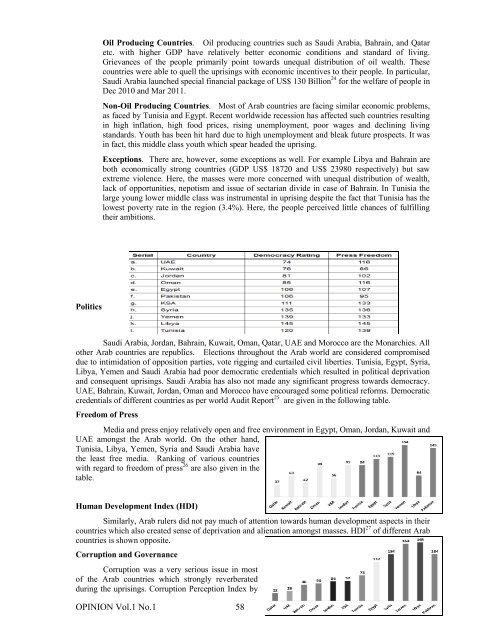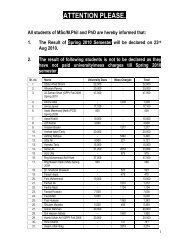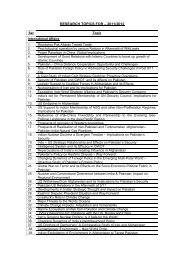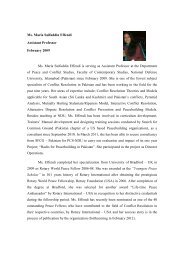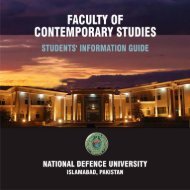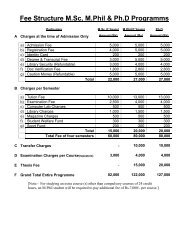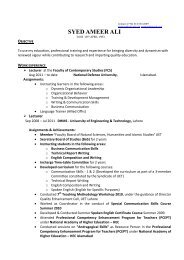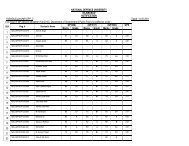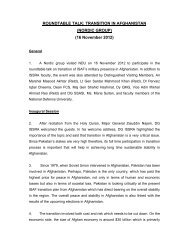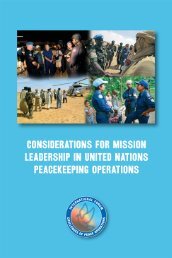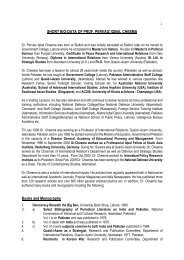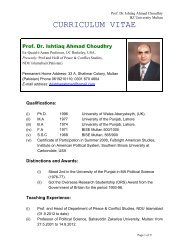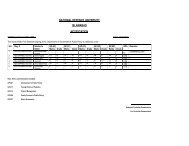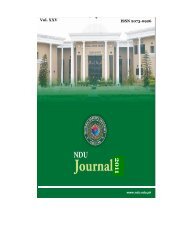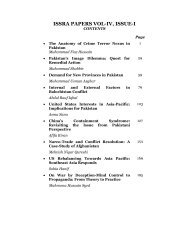OPINION Vol.1, No.1 June 2013 - National Defence University
OPINION Vol.1, No.1 June 2013 - National Defence University
OPINION Vol.1, No.1 June 2013 - National Defence University
You also want an ePaper? Increase the reach of your titles
YUMPU automatically turns print PDFs into web optimized ePapers that Google loves.
Oil Producing Countries. Oil producing countries such as Saudi Arabia, Bahrain, and Qatar<br />
etc. with higher GDP have relatively better economic conditions and standard of living.<br />
Grievances of the people primarily point towards unequal distribution of oil wealth. These<br />
countries were able to quell the uprisings with economic incentives to their people. In particular,<br />
Saudi Arabia launched special financial package of US$ 130 Billion 24 for the welfare of people in<br />
Dec 2010 and Mar 2011.<br />
Non-Oil Producing Countries. Most of Arab countries are facing similar economic problems,<br />
as faced by Tunisia and Egypt. Recent worldwide recession has affected such countries resulting<br />
in high inflation, high food prices, rising unemployment, poor wages and declining living<br />
standards. Youth has been hit hard due to high unemployment and bleak future prospects. It was<br />
in fact, this middle class youth which spear headed the uprising.<br />
Exceptions. There are, however, some exceptions as well. For example Libya and Bahrain are<br />
both economically strong countries (GDP US$ 18720 and US$ 23980 respectively) but saw<br />
extreme violence. Here, the masses were more concerned with unequal distribution of wealth,<br />
lack of opportunities, nepotism and issue of sectarian divide in case of Bahrain. In Tunisia the<br />
large young lower middle class was instrumental in uprising despite the fact that Tunisia has the<br />
lowest poverty rate in the region (3.4%). Here, the people perceived little chances of fulfilling<br />
their ambitions.<br />
Politics<br />
Saudi Arabia, Jordan, Bahrain, Kuwait, Oman, Qatar, UAE and Morocco are the Monarchies. All<br />
other Arab countries are republics. Elections throughout the Arab world are considered compromised<br />
due to intimidation of opposition parties, vote rigging and curtailed civil liberties. Tunisia, Egypt, Syria,<br />
Libya, Yemen and Saudi Arabia had poor democratic credentials which resulted in political deprivation<br />
and consequent uprisings. Saudi Arabia has also not made any significant progress towards democracy.<br />
UAE, Bahrain, Kuwait, Jordan, Oman and Morocco have encouraged some political reforms. Democratic<br />
credentials of different countries as per world Audit Report 25 are given in the following table.<br />
Freedom of Press<br />
Media and press enjoy relatively open and free environment in Egypt, Oman, Jordan, Kuwait and<br />
UAE amongst the Arab world. On the other hand,<br />
Tunisia, Libya, Yemen, Syria and Saudi Arabia have<br />
the least free media. Ranking of various countries<br />
with regard to freedom of press 26 are also given in the<br />
table.<br />
Human Development Index (HDI)<br />
Similarly, Arab rulers did not pay much of attention towards human development aspects in their<br />
countries which also created sense of deprivation and alienation amongst masses. HDI 27 of different Arab<br />
countries is shown opposite.<br />
Corruption and Governance<br />
Corruption was a very serious issue in most<br />
of the Arab countries which strongly reverberated<br />
during the uprisings. Corruption Perception Index by<br />
<strong>OPINION</strong> <strong>Vol.1</strong> <strong>No.1</strong> 58 <strong>June</strong> <strong>2013</strong>


